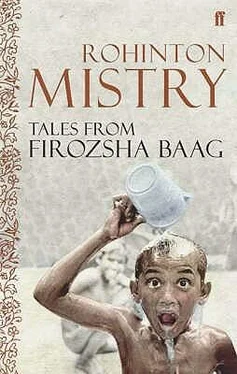Rohinton Mistry - Tales From Firozsha Baag
Здесь есть возможность читать онлайн «Rohinton Mistry - Tales From Firozsha Baag» весь текст электронной книги совершенно бесплатно (целиком полную версию без сокращений). В некоторых случаях можно слушать аудио, скачать через торрент в формате fb2 и присутствует краткое содержание. Год выпуска: 2006, Издательство: Faber & Faber, Жанр: Современная проза, на английском языке. Описание произведения, (предисловие) а так же отзывы посетителей доступны на портале библиотеки ЛибКат.
- Название:Tales From Firozsha Baag
- Автор:
- Издательство:Faber & Faber
- Жанр:
- Год:2006
- ISBN:нет данных
- Рейтинг книги:3 / 5. Голосов: 1
-
Избранное:Добавить в избранное
- Отзывы:
-
Ваша оценка:
- 60
- 1
- 2
- 3
- 4
- 5
Tales From Firozsha Baag: краткое содержание, описание и аннотация
Предлагаем к чтению аннотацию, описание, краткое содержание или предисловие (зависит от того, что написал сам автор книги «Tales From Firozsha Baag»). Если вы не нашли необходимую информацию о книге — напишите в комментариях, мы постараемся отыскать её.
Tales From Firozsha Baag — читать онлайн бесплатно полную книгу (весь текст) целиком
Ниже представлен текст книги, разбитый по страницам. Система сохранения места последней прочитанной страницы, позволяет с удобством читать онлайн бесплатно книгу «Tales From Firozsha Baag», без необходимости каждый раз заново искать на чём Вы остановились. Поставьте закладку, и сможете в любой момент перейти на страницу, на которой закончили чтение.
Интервал:
Закладка:
Rohinton Mistry
Tales From Firozsha Baag
Auspicious Occasion
With a bellow Rustomji emerged from the WC. He clutched his undone pyjama drawstring, an extreme rage distorting his yet unshaven features. He could barely keep the yellow-stained pyjamas from falling.
“Mehroo! Arré Mehroo! Where are you?” he screamed. “I am telling you, this is more than I can take! Today, of all days, on Behram roje . Mehroo! Are you listening?”
Mehroo came, her slippers flopping in time — ploof ploof — one two. She was considerably younger than her husband, having been married off to a thirty-six-year-old man when she was a mere girl of sixteen, before completing her final high-school year. Rustomji, a successful Bombay lawyer, had been considered a fine catch by Mehroo’s parents — no one had anticipated that he would be wearing dentures by the time he was fifty. Who, while trapped in the fervour of matchmaking at the height of the wedding season, could imagine a toothless gummy mouth, morning after morning, greeting a woman in her absolute prime? No one. Certainly not Mehroo. She came from an orthodox Parsi family which observed all important days on the Parsi calendar, had the appropriate prayers and ceremonies performed at the fire-temple, and even set aside a room with an iron-frame bed and an iron stool for the women during their unclean time of the month.
Mehroo had welcomed her destiny and had carried to her new home all the orthodoxy of her parents’. Except for the separate “unclean” room which Rustomji would not hear of, she was permitted everything. In fact, Rustomji secretly enjoyed most of the age-old traditions while pretending indifference. He loved going to the fire-temple dressed up in his sparkling white dugli , starched white trousers, the carefully brushed pheytoe on his head — he had a fine head of hair, not yet gone the way of his teeth.
To Rustomji’s present yelling Mehroo responded good-humouredly. She tried to remain calm on this morning which was to culminate in prayers at the fire-temple; nothing would mar the perfection of Behram roje if she could help it. This day on the Parsi calendar was particularly dear to her: on Behram roje her mother had given birth to her at the Awabai Petit Parsi Lying-in Hospital; it was also the day her navjote had been performed at the age of seven, when she was confirmed a Zoroastrian by the family priest, Dustoor Dhunjisha; and finally, Rustomji had married her on Behram roje fourteen years ago, with feasting and celebration continuing into the wee hours of the morning — it was said that not one beggar had gone hungry, such were the quantities of food dumped in the garbage cans of Cama Garden that day.
Indeed, Behram roje meant a lot to Mehroo. Which is why with a lilt in her voice she sang out: “Com-ing! Com-ing!”
Rustomji growled back, “You are deaf or what? Must I scream till my lungs burst?”
“Coming, coming! Two hands, so much to do, the gunga is late and the house is unswept
“Arre forget your gunga-bunga!” howled Rustomji. “That stinking lavatory upstairs is leaking again! God only knows what they do to make it leak. There I was, squatting — barely started — when someone pulled the flush. Then on my head I felt — pchuk — all wet! On my head!”
“On your head? Chhee chhee chhee! How horrible! How inauspicious! How…” and words failed her as she cringed and recoiled from the befouling event. Gingerly she peeked into the WC, fearing a deluge of ordure and filth. What she did see, however, was a steady leak — drip drip drip drip — rhythmical and regular, straight into the toilet bowl, so that using it was out of the question. Rustomji, still clutching his pyjama drawstring, a wild unravelled look about him, fumed behind her as she concluded her inspection.
“Why not call a good plumber ourselves this time instead of complaining to the Baag trustees?” Mehroo ventured. “They will once again do shoddy work.”
“I will not spend one paisa of my hard-earned earnings! Those scoundrels sitting with piles of trust money hidden under their arses should pay for it!” stormed Rustomji, making sweeping gestures with the hand that was free of the pyjama string. “I will crap at their office, I will go to crap at their houses, I will crap on their doorsteps if necessary!”
“Hush, Rustomji, don’t say such things on Behram roje? Mehroo chided. “If you still have to go, I will see if Hirabai next door does not mind.”
“With her stupid husband there? A thousand times I’ve told you I will not step inside in Nariman’s presence. Anyway, it is gone now. Vanished,” said Rustomji with finality. “Now my whole day will be spoilt. And who knows,” he added darkly with perverse satisfaction, “this may even lead to constipation.”
“Nariman must have left for the library. I will ask Hirabai, you might have to go later. I am going there now to telephone the office, and when I come back I will make you a nice hot cup of tea. Drink that quickly, gudh-gudh , the urge will return,” soothed Mehroo, and left. Rustomji decided to boil water for his bath. He felt unclean all over.
The copper vessel was already filled with water. But someone had forgotten to cover it, and plaster from the ceiling had dripped into it. It floated on the surface, little motes of white. Like the little motes that danced before Rustomji’s eyes when he was very tired, after a long day in the hot, dusty courthouse, or when he was very angry, after shouting at the boys of Firozsha Baag for making a nuisance with their cricket in the compound.
Plaster had been dripping for some years now in his A Block flat, as it had been in most of the flats in Firozsha Baag. There had been a respite when Dr. Mody, gadfly to the trustees (bless his soul), had pressed for improvement with the Baag management. But that period ended, and the trustees adopted a new policy to stop all maintenance work not essential to keep the buildings from being condemned.
Following a period of resistance, most of the tenants had taken to looking after their own flats, getting them replastered and painted. But to this day Rustomji stubbornly held out, calling his neighbours fools for making things easy for the trustees instead of suffering the discomfort of peeling walls till the scoundrels capitulated.
When the neighbours, under the leadership of Nariman Hansotia, had decided to pool some money and hire a contractor to paint the exterior of A Block, Rustomji, on principle, refused to hand over his share. The building had acquired an appalling patina of yellow and grey griminess. But even the likeable and retired Nariman, who drove every day except Sunday in his 1932 Mercedes-Benz to the Cawasji Framji Memorial Library to read the daily papers from around the world, could not persuade Rustomji to participate.
Totally frustrated, Nariman had returned to Hirabai: “That curmudgeon won’t listen to reason, he has sawdust in his head. But if I don’t make him the laughing-stock, my name isn’t Nariman.” Out of this exchange had grown an appended name: Rustomji-the-curmudgeon, and it had spread through Firozsha Baag, enjoying long life and considerable success.
And Nariman Hansotia had then convinced the neighbours to go ahead with the work, advising the contractor to leave untouched the exterior of Rustomji’s flat. It would make Rustomji ashamed of himself, he thought, when the painting was finished and the sparkling façade of the building sported one begrimed square. But Rustomji was delighted. He triumphantly told everyone he met, “Mr. Hansotia bought a new suit, and it has a patch on one knee!”
Читать дальшеИнтервал:
Закладка:
Похожие книги на «Tales From Firozsha Baag»
Представляем Вашему вниманию похожие книги на «Tales From Firozsha Baag» списком для выбора. Мы отобрали схожую по названию и смыслу литературу в надежде предоставить читателям больше вариантов отыскать новые, интересные, ещё непрочитанные произведения.
Обсуждение, отзывы о книге «Tales From Firozsha Baag» и просто собственные мнения читателей. Оставьте ваши комментарии, напишите, что Вы думаете о произведении, его смысле или главных героях. Укажите что конкретно понравилось, а что нет, и почему Вы так считаете.












